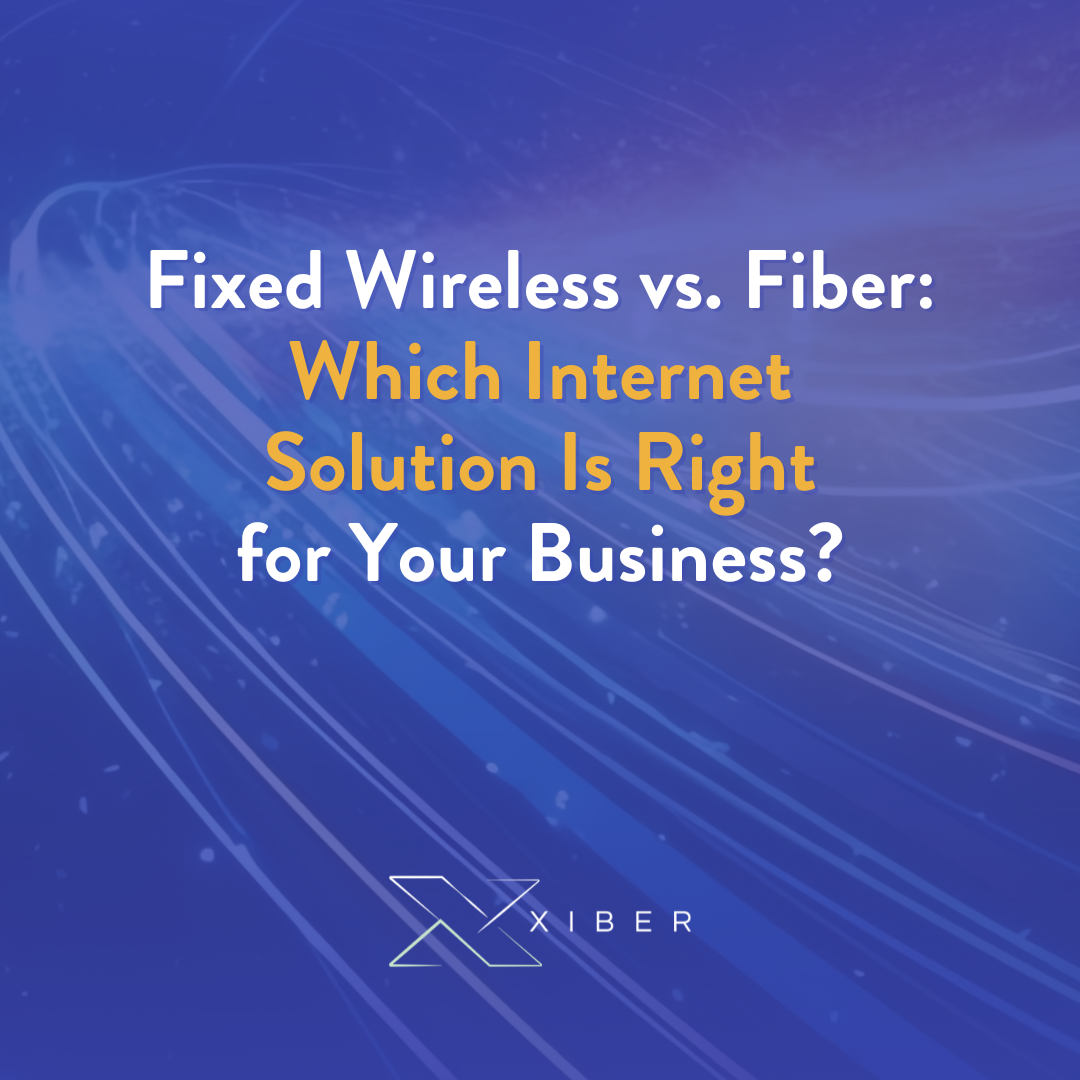When it comes to business internet, there’s no shortage of opinions — but one question seems to dominate the conversation: Fixed Wireless or Fiber?
At Xiber, we believe the best answer isn't one-size-fits-all. It’s about understanding your business needs, location, growth plans, and risk tolerance. Here’s a closer look at the real story behind this debate — and how your business can make the smartest choice.
At Xiber, we believe the best answer isn't one-size-fits-all. It’s about understanding your business needs, location, growth plans, and risk tolerance. Here’s a closer look at the real story behind this debate — and how your business can make the smartest choice.
Reliability and Performance: Not What It Used to Be
Fiber has long been hailed as the "gold standard" for business connectivity — and with good reason. A physical fiber-optic line can offer incredibly high speeds, consistent performance, and low latency.
However, modern fixed wireless technology has changed the game. Today’s point-to-point and multi-band wireless systems deliver gigabit speeds and fiber-like reliability, even in tough environments. In fact, when properly engineered, many businesses can't tell the difference.
However, modern fixed wireless technology has changed the game. Today’s point-to-point and multi-band wireless systems deliver gigabit speeds and fiber-like reliability, even in tough environments. In fact, when properly engineered, many businesses can't tell the difference.
Deployment Speed: A Major Advantage for Fixed Wireless
Need to get online fast? Fixed wireless can be installed in days or weeks, not months. Fiber installations, especially in dense urban areas or rough terrain, can face long permitting processes, construction delays, and high costs.
For businesses moving into new spaces, opening satellite offices, or scaling quickly, fixed wireless provides the speed to match your momentum.
For businesses moving into new spaces, opening satellite offices, or scaling quickly, fixed wireless provides the speed to match your momentum.
Cost: Lower Upfront Investment, Faster ROI
Fiber is an investment — and sometimes a big one. Installation often involves trenching, pulling cable, and potentially expensive infrastructure upgrades.
In contrast, fixed wireless avoids many of those costs. With no need for underground construction, businesses typically see lower upfront costs and faster return on investment, without sacrificing quality.
In contrast, fixed wireless avoids many of those costs. With no need for underground construction, businesses typically see lower upfront costs and faster return on investment, without sacrificing quality.
Accessibility and Flexibility
In many parts of the country, fiber just isn’t available — or it’s prohibitively expensive to extend. Fixed wireless shines in these scenarios, bringing high-speed connectivity to areas where fiber simply can’t reach.
It’s also easier to relocate or adjust fixed wireless equipment as your business evolves.
It’s also easier to relocate or adjust fixed wireless equipment as your business evolves.
Redundancy and Resiliency: Why Smart Businesses Choose Both
The savviest companies don't view fixed wireless and fiber as an either/or decision. They use both.
By pairing a fiber connection with fixed wireless, businesses create true network redundancy. This reduces the risk of downtime from fiber cuts, construction accidents, or network issues — keeping operations running smoothly no matter what.
By pairing a fiber connection with fixed wireless, businesses create true network redundancy. This reduces the risk of downtime from fiber cuts, construction accidents, or network issues — keeping operations running smoothly no matter what.
Security: Strong Protection on Both Fronts
Both fiber and fixed wireless connections can be highly secure. Point-to-point microwave links are especially difficult to intercept, and encryption protocols can secure data in transit over both mediums.
Technology Is Evolving — Fast
With new advances like multi-band fixed wireless and next-gen hybrid networks, fixed wireless isn’t just catching up to fiber — in some cases, it’s outpacing it. Businesses today have more powerful, flexible options than ever before.
The Bottom Line
The right choice depends on your business goals, your timeline, your budget, and your location. In some cases, fiber is the best fit. In others, fixed wireless delivers a smarter, faster, and more cost-effective solution.
At Xiber, we’re experts in designing custom internet solutions — whether that means fiber, fixed wireless, or a hybrid approach. Let's find the best path forward for your business.
At Xiber, we’re experts in designing custom internet solutions — whether that means fiber, fixed wireless, or a hybrid approach. Let's find the best path forward for your business.






